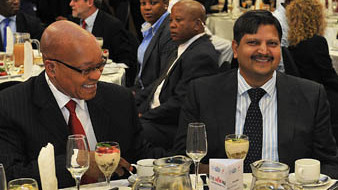This is an archived copy of the first version of my open letter to democrats. The updated version is here.
Part 1: A second what?
Dear democrats
Some of you may remember me as news commenter way back, roughly in the period 2008-12. During that time, I also wrote an open letter to the ANC Youth League. You can see a summary here.
Time constraints forced me to stop commenting, but really, 2017 turns out to be such a momentous year for our country that one cannot stay on the sidelines, then complain about the way things turn out.
And nightmare visions of how bad things may turn out are not all that motivate me to write to you. I also think that we could actually arrange something pretty good for ourselves and our descendants here in our neck of the woods, while also playing our part to make the world a more pleasant and less dangerous place.
By confronting the issues that ruined our democracy, perhaps we can help point a way for fellow democrats the world over, in developing and developed countries alike, who are also asking themselves the same kind of questions we ask about the capture of democracy. Democracy is redefining itself everywhere at the moment, and our country is in a good position to span global divides.

Photo © 2010 J. Ronald Lee
If one really insists on looking on the bright side, one could argue that we were to some degree lucky that our captors filled our pot with boiling water, to use the “boiling frog” metaphor, prompting our current scramble to get out fast, instead of getting us used to gradually heating water. I suppose one could say that gradual heating has taken place for years, but fact is that we’re not cooked yet, on the contrary: we’re performing some very fine jumps to get out of the pot at the moment.
The purpose of the letter is to propose a common-sense, doable solution to free our state from capture. The proposal depends very much on the input of fellow democrats though, for correction, expansion and even for dismantling: the only goal is to find the quickest, most effective way to get our democracy back. So please comment if you have a contribution to make.
But first, let me reassure you about the title: I have no intention of proposing that SA be divided in two. I mean “Second Republic” in the sense that the French use the term, signalling major shifts in the way they define their democracy by changing their laws and constitution, throughout its 225 year history of ups and downs since their First Republic (established during the French Revolution).
They’re at their Fifth now (in place since 1958) – and counting: one of the top contenders in the recent French presidential elections ran on a ticket of changing the constitution and ringing in the Sixth Republic.

One of the Gupta brothers, Atul, with President Zuma at The New Age, Transnet and SABC business briefing, 16 Mar 2012. Credit: GCIS.
I’ll come back to the subject, but for the moment suffice it to say that my call for a Second Republic has nothing to do with secession and everything to do with making a clean break with a political dispensation that put the ridiculous trio from Saharanpur in charge of our country. (The humiliation, LOL! We’d have to make a pretty spectacular comeback to live this one down. But don’t worry, we can. Read on.)
Here’s how I’m going to go about it:
In Part 2 of the letter I argue that we no longer live in a democracy, and that calling oneself a democrat means endeavoring to change that state of affairs.
In Parts 3 and 4 I look at what needs to be changed to get our democracy back.
Part 3 deals with what I see as the main obstacle: political funding.
Part 4 outlines what I see as the four other obvious causes of state capture:
-
Internal party elections
-
Electoral representation
-
Insufficient checks on the power of the president
-
Business interests of state employees
Because all the obvious causes of capture relate to the laws on our statute books (including our supreme law, the Constitution), the only way to remove them peacefully is though the ballot box.
In Part 5: How many votes are we looking at? I try to determine which of the essential changes require changes to the Constitution, which in turn requires a two-thirds parliamentary majority.
In Part 6: Any chance of a super-majority? I look at whether there’s any chance in the near term of buy-in from the ANC to make the changes to the laws that captured us, and keep us captured.
Part 7: How about a simple majority? is central to my proposal. I argue that an ANC loss in 2019 is far from certain, and that another five years of undemocratic rule is simply not an option for democrats.
I therefore propose that democrats turn the 2019 elections into a “referendum” for a mandate to free our state from capture. I argue that opposition parties can not form a meaningful coalition if they stand on their full set of policies, yet a coalition is what is needed to defeat the captors.
So what I propose is that the broad spectrum of parties, organisations and individuals opposing state capture unite around a single issue, a single promise to voters – to change the laws that keep our state captured. Nothing else. No privatisation, no nationalisation, nothing else than the promise to give us our democracy back.
Then, once that is done, to call new elections where normal party politics resume under the new rules. That must be the deal with voters. The only way to get a broad enough consensus is to focus only on what all democrats agree on: to stop state capture in its tracks.
Part 8 consists of three “sub-letters”: open letters that still form part of my open letter to democrats, but are addressed to political role-players who are directly linked to my proposal.
They are:
In the final part of my letter, Part 9: Towards a Second Republic, I argue that only a clean, conscious break with our captured present will make it possible for us get our democracy back. I also look at some tactical challenges we are likely to face in the process.
